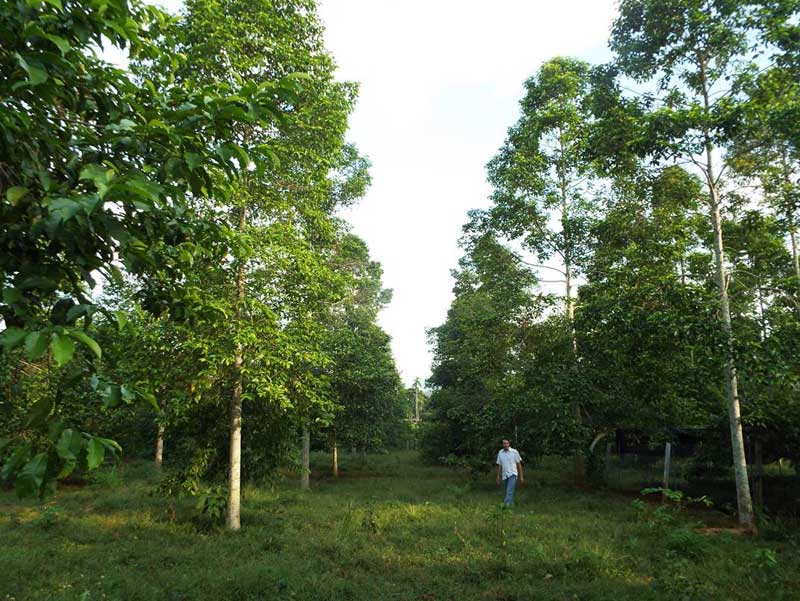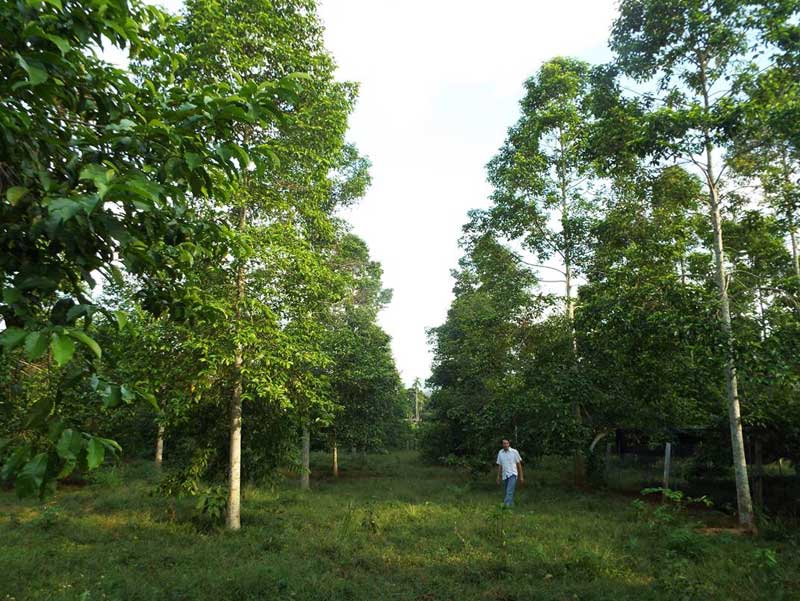
(HBO) – With the love of land, trees and different mind, after ten years, Mr. Hoang Van Giang has become the owner of a Doi garden with 400 trees, which is considered as the largest scale in Lac Son area. In addition, his family raises hundreds of indigenous pigs, plants 2 hectares of yellow- hearted oranges in the commercial period. This economic model is being operated in the right direction and within some years, Mr. Giang can earn billion dongs from selling Doi trees.
When starting Doi plantation, many people
showed their doubt why he did not plant oranges on all his land because at that
time orange plantation could make the earning of 500 million dongs / hectare.

The Doi garden of 400 trees of Mr. Hoang Van
Giang has given the initial harvesting crop.
Mr. Giang introduced and told us the stories
about Doi trees with his delight and passion. Doi trees has higher value than
other kinds of trees, loving trees means getting money. At the same street of
La Van Cau, next to Mr. Giang’s house, Mr. Nguyen Duc Chieu also plants Doi
trees for sunshine protection for 15 years, 4-5 trees have in harvesting crop,
which can get from at least 5 kg to 10 kg per one tree. For two recent years,
he collected more than 30 million VND from selling Doi trees.
The Doi garden has 400 trees, in which 300
trees are original, (naturally planted, 100 trees were grafted) starts to be
harvested. Mr Giang said: The Doi garden has made profit, each plant can be
collected 3 kg, with the price from 1,2 – 1,5 million VND /kg, which is so higher
than planting oranges or pomelos. Only within two more years, when Doi tree is
at the peak, he can earn billion VND. Not only planting Doi, oranges, but he
also plans farming to raise indigenous pigs with hundreds of animals. He is
also a basic provider of Doi trees for other Northern areas and Tay Nguyen,
which provides him a large earning resources, at a time he needs to hire more
than 20 workers.
With the ahead mindset, Mr. Giang has just
bought 5 hectares of land in Chi Dao commune – the core Doi tree area in Lac
Son district to expand the "golden” area. Moreover, Mr. Giang is having a plan
of making Doi tree brand. He packed Doi seed that his family produced with the
brand name of "Dổi Hoàng Giang”, he has introduced and marketed
in tourism areas such as Mu Waterfall and some other tourist destinations and
to be favored by customers.
According to data from the Hoa Binh Provincial Party Committee, the industrial production index for the first six months of 2025 is estimated to have increased by 20% compared to the same period last year. This marks the highest year-on-year growth rate for this period since 2020.
In the first six months of 2025, Hoa Binh province’s export turnover was estimated at 1.145 billion USD, marking an 18.11% increase compared to the same period in 2024. Import turnover was estimated at $ 804 million, a 17.15% increase, which helped the province maintain a positive trade balance.
The lives of the ethnic minority farmers in Tan Lac district have gradually improved thanks to the new directions in agricultural production. This is a testament to the collective strength fostered through the professional associations and groups implemented by various levels of the district’s Farmers’ Union.
With the motto the "product quality comes first,” after nearly one year of establishment and operation, Muong village’s Clean Food Agricultural and Commercial Cooperative, located in Cau Hamlet, Hung Son Commune (Kim Boi district), has launched reputable, high-quality agricultural products to the market that are well-received by consumers. The products such as Muong village’s pork sausage, salt-cured chicken, and salt-cured pork hocks have gradually carved out a place in the market and they are on the path to obtaining the OCOP certification.
In the past, the phrase "bumper harvest, rock-bottom prices" was a familiar refrain for Vietnamese farmers engaged in fragmented, small-scale agriculture. But today, a new spirit is emerging across rural areas of Hoa Binh province - one of collaboration, organisation, and collective economic models that provide a stable foundation for production.
Maintaining growing area codes and packing facility codes in accordance with regulations is a mandatory requirement for agricultural products to be eligible for export. Recently, the Department of Agriculture and Environment of Hoa Binh province has intensified technical supervision of designated farming areas and packing facilities to safeguard the "green passport" that enables its products to access international markets.



